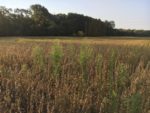Advertise Follow Us
Articles Tagged with ''marestail''
CROP PROTECTION ROUNDUP 2021
Erratic Armyworm Outbreaks Require Careful Scouting
Many entomologists say armyworms typically move from weedy grasses and small-grain cover crops to damage nearby corn.
Read More









